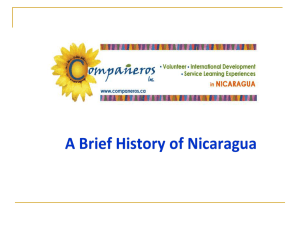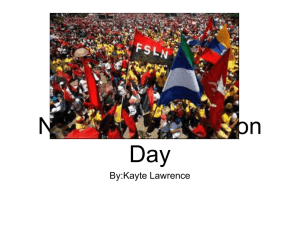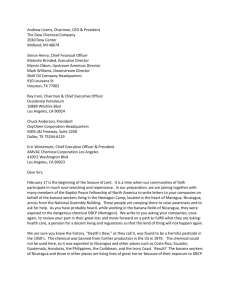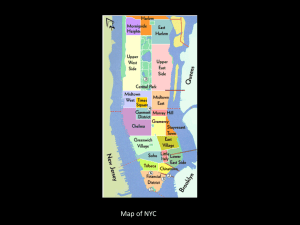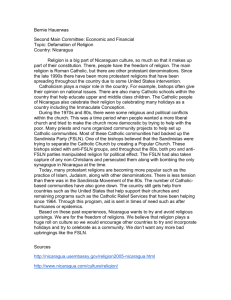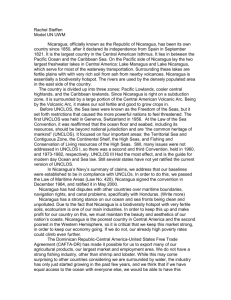NICARAGUA
advertisement
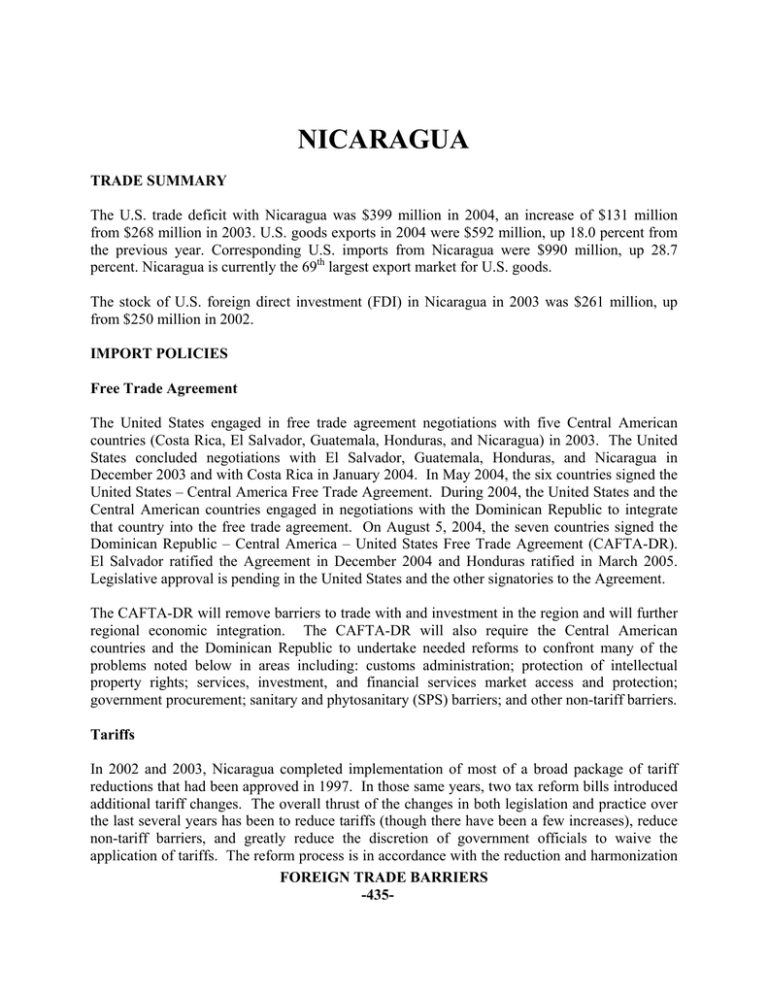
NICARAGUA TRADE SUMMARY The U.S. trade deficit with Nicaragua was $399 million in 2004, an increase of $131 million from $268 million in 2003. U.S. goods exports in 2004 were $592 million, up 18.0 percent from the previous year. Corresponding U.S. imports from Nicaragua were $990 million, up 28.7 percent. Nicaragua is currently the 69th largest export market for U.S. goods. The stock of U.S. foreign direct investment (FDI) in Nicaragua in 2003 was $261 million, up from $250 million in 2002. IMPORT POLICIES Free Trade Agreement The United States engaged in free trade agreement negotiations with five Central American countries (Costa Rica, El Salvador, Guatemala, Honduras, and Nicaragua) in 2003. The United States concluded negotiations with El Salvador, Guatemala, Honduras, and Nicaragua in December 2003 and with Costa Rica in January 2004. In May 2004, the six countries signed the United States – Central America Free Trade Agreement. During 2004, the United States and the Central American countries engaged in negotiations with the Dominican Republic to integrate that country into the free trade agreement. On August 5, 2004, the seven countries signed the Dominican Republic – Central America – United States Free Trade Agreement (CAFTA-DR). El Salvador ratified the Agreement in December 2004 and Honduras ratified in March 2005. Legislative approval is pending in the United States and the other signatories to the Agreement. The CAFTA-DR will remove barriers to trade with and investment in the region and will further regional economic integration. The CAFTA-DR will also require the Central American countries and the Dominican Republic to undertake needed reforms to confront many of the problems noted below in areas including: customs administration; protection of intellectual property rights; services, investment, and financial services market access and protection; government procurement; sanitary and phytosanitary (SPS) barriers; and other non-tariff barriers. Tariffs In 2002 and 2003, Nicaragua completed implementation of most of a broad package of tariff reductions that had been approved in 1997. In those same years, two tax reform bills introduced additional tariff changes. The overall thrust of the changes in both legislation and practice over the last several years has been to reduce tariffs (though there have been a few increases), reduce non-tariff barriers, and greatly reduce the discretion of government officials to waive the application of tariffs. The reform process is in accordance with the reduction and harmonization FOREIGN TRADE BARRIERS -435- of a common external tariff among members of the Central American Common Market (CACM) to between zero percent and 15 percent on most items. Nicaragua imposes regular import duties of 10 percent or 15 percent on many final consumer goods and a duty of 5 percent on certain primary or intermediate goods from outside Central America that compete with products produced in CACM countries. The tariff is assessed on a good’s CIF value. Once the CAFTA-DR goes into effect, about 80 percent of U.S. industrial and commercial goods will enter the region duty-free, with the remaining tariffs on such goods phased out over 10 years. Nearly all textile and apparel goods that meet the Agreement’s rules of origin will be duty-free and quota-free immediately, promoting new opportunities for U.S. and regional fiber, yarn, fabric and apparel manufacturing. (The Agreement’s tariff treatment for textile and apparel goods may be made retroactive to January 1, 2004.) A small number of protected agricultural commodities, notably rice and chicken parts, have particularly high tariff rates. Processed rice faces tariffs as high as 61 percent, down from a maximum of 103.5 percent in 2002. Certain chicken parts face a tariff of 170 percent. Tariffs on corn, previously higher, now range from 10 percent to 15 percent. In May 2003, Nicaragua raised tariffs on cheese and certain other dairy products from countries outside the CACM region to a common external tariff rate of 40 percent, from a prior rate of 15 percent, an increase that was consistent with Nicaragua’s WTO rights. Under the CAFTA-DR, Nicaragua will eliminate its tariffs on nearly all agricultural products within 15 years, including its tariffs on rice and yellow corn. Nicaragua will eliminate its tariffs on chicken leg quarters within 18 years and on dairy products within 20 years. For the most sensitive products, tariff rate quotas will permit some immediate zero-duty access for specified quantities during the tariff phase-out period, which will expand over time. Nicaragua will liberalize trade in white corn through expansion of a TRQ. Non-Tariff Measures A “consumption tax” on luxury items is levied on a limited number of items. The tax is generally lower than 15 percent, with a few exceptions noted below. Although the ISC is not applied exclusively to imports, the value on which it is based varies depending on whether the product is produced domestically or abroad. While the ISC on domestic goods is based on a manufacturer's price, the ISC on imported goods is based on the CIF value. Alcoholic beverages and tobacco products are exceptions; for these products, the ISC is based on the price charged to the retailer. In accordance with April 2000 amendments to Nicaragua’s tax laws, the ISC on soft drinks was lowered from a level of 18 percent in 1999 to 15 percent in 2000 and 12 percent in 2001. A further reduction to the target rate of 9 percent became effective in 2004. FOREIGN TRADE BARRIERS -436- STANDARDS, TESTING, LABELING AND CERTIFICATION Products that meet domestic U.S. standards are generally accepted in the Nicaraguan market with little need for further certification. U.S. exporters of food products must meet minimal phytosanitary and labeling requirements. In Nicaragua, all brands of alcoholic beverages must be registered annually with the Ministry of Public Health, and import licenses are required to import beverage alcohol. Under CAFTA-DR, Nicaragua commits to abide by the terms of the WTO’s Import Licensing Agreement. U.S. industry has expressed concern with Nicaragua’s proposed standards for rum and aguardiente. However, the five Central American countries, including Nicaragua, are in the process of developing common standards for several products, including distilled spirits, which could serve to increase market access and facilitate trade. Nicaragua committed under the CAFTA-DR to explicitly recognize Bourbon and Tennessee whiskey as distinctive products of the United States, an objective of our distilled spirits industry. There is currently no regulatory process for approving agricultural biotechnology products for import or sale. Imported agricultural products derived from biotechnology are supposed to be identified as such, but there is no law in place governing the use of labels on biotechnology products. In August 2003 an executive decree called for the establishment of an interagency commission to develop procedures for risk analysis of agricultural biotechnology products, norms for their use, and regulations for their production and importation. When the United States and Central America launched the free trade agreement negotiations, they initiated an active working group dialogue on SPS barriers to agricultural trade that met alongside the negotiations to facilitate market access. The objective was to leverage the impetus of active trade negotiations to seek difficult changes to the Central American countries’ SPS regimes. Through the work of this group, Nicaragua has committed to resolve specific measures affecting U.S. exports to Nicaragua. In particular, for meat, dairy and poultry, Nicaragua is moving toward recognizing import eligibility for all plants inspected under the U.S. food safety and inspection system. GOVERNMENT PROCUREMENT Nicaragua’s law on government procurement, which went into effect in January 2000, provides for nondiscrimination among suppliers and requires that most government procurement contracts be advertised in national newspapers and the Internet. However, some contractors have complained of inadequate notification of pending procurements. Nicaragua is not a party to the WTO Agreement on Government Procurement. The CAFTA-DR requires fair and transparent procurement procedures, including advance notice of purchases and timely and effective bid review procedures. Under the CAFTA-DR, U.S. suppliers will be permitted to bid on procurements covered by the Agreement for most FOREIGN TRADE BARRIERS -437- Nicaraguan government entities, including key ministries and state-owned enterprises on the same basis as Nicaraguan suppliers. The anti-corruption provisions in the Agreement require each government to ensure that bribery in matters affecting trade and investment, including in government procurement, is treated as a criminal offense, or is subject to comparable penalties, under its law. EXPORT SUBSIDIES Nicaragua does not provide export financing. However, all exporters receive tax benefit certificates equivalent to 1.5 percent of the FOB port of exit value of the exported goods. Foreign inputs for Nicaraguan export goods from the country’s free trade zones enter duty-free and are exempt from value-added tax. Under the CAFTA-DR, Nicaragua may not adopt new duty waivers or expand existing duty waivers conditioned on the fulfillment of a performance requirement (e.g., the exportation of a given level or percentage of goods). Nicaragua may maintain existing duty waiver measures provided such measures are consistent with its WTO obligations. INTELLECTUAL PROPERTY RIGHTS (IPR) PROTECTION Nicaragua has strengthened its legal framework for protection of intellectual property rights over recent years. Nonetheless, although the Nicaraguan government has dedicated three public prosecutors solely to IPR issues, enforcement remains weak. Protection of well-known trademarks is poorly enforced. According to industry sources, the government made two attempts to crack down on music recording piracy in 2001 but has made no significant raids or arrests since then, and anecdotal evidence suggests an increase in the reproduction of pirated music and videos. The U.S. Government and industry are working with the Nicaraguan government to provide training for effective enforcement. Lack of protection for pharmaceutical and agricultural product test data against unfair commercial use also remains a serious concern. Implementation of the CAFTA-DR obligations will require Nicaragua to protect undisclosed test data submitted for the purpose of product marketing approval of pharmaceutical and agricultural chemical products against disclosure and unfair commercial use CAFTA-DR obligations will also strengthen Nicaragua’s IPR protection regime to conform with, and in many areas exceed, WTO norms. CAFTA-DR obligations will also provide stronger deterrence against piracy and counterfeiting by criminalizing end user piracy and requiring Nicaragua to authorize the seizure, forfeiture, and destruction of counterfeit and pirated goods and the equipment used to produce them. The CAFTA-DR text also mandates both statutory and actual damages for copyright and trademark infringement, which would ensure that monetary damages can be awarded even when it is difficult to assign a monetary value to the violation. FOREIGN TRADE BARRIERS -438- SERVICES BARRIERS Financial Services Nicaragua has ratified its commitments under the 1997 WTO Financial Services Agreement. Nicaragua’s WTO commitments cover most banking services, including acceptance of deposits, lending, leasing, guarantees, and foreign exchange. However, its WTO commitments do not cover security or asset management. Nicaragua allows foreign banks to operate either as 100 percent-owned subsidiaries or as branches, but no U.S. bank has yet re-entered the Nicaraguan financial market since several major U.S. banks withdrew in the 1970s. The CAFTA-DR will make it easier for U.S. banks to enter the Nicaraguan market. U.S. financial service suppliers will have full rights to establish subsidiaries, joint ventures or branches for banks. Legislation passed in 1996 opened the insurance industry to private sector participation. Private insurance companies now compete with the government-owned firm INISER. However, no U.S. or other foreign insurance company has entered the Nicaraguan market. Under the CAFTA-DR, U.S. insurance suppliers will have full rights to establish subsidiaries, joint ventures or branches. Nicaragua will allow U.S.-based firms to supply insurance on a cross-border basis, including reinsurance; reinsurance brokerage; marine, aviation and transport (MAT) insurance; and other insurance services. Further, Nicaragua will accord substantial market access in services across their entire services regime, subject to very few exceptions. The telecommunications sector is in transition from state ownership to private ownership. Fiftyone percent of Enitel, the former state telephone monopoly, has been sold and a process to sell the remaining 49 percent is nearly complete. Private mobile telephone companies, and international operators, have at times complained that the regulatory agency TELCOR exhibits favoritism toward Enitel. For example, at the end of 2004, Enitel unilaterally raised termination rates for calls sent to wireless networks and blocked traffic to such networks when carriers refused to pay the 100% increase in those rates. This action by Enitel was met with little or no intervention by TELCOR to require Enitel to justify such rate increases. In general, however, TELCOR has encouraged competition in its licensing and regulatory practices, and under the CAFTA-DR, Nicaragua has committed to open its telecommunications sector to service and investment by U.S. providers. The Law on Promotion of National Artistic Expression and on Protection of Nicaraguan Artists (Law no. 215, National Gazette 134, July 17, 1996) requires that foreign production companies contribute 5 percent of total production costs to a local cultural fund. In addition, the law requires that 10 percent of the technical, creative or artistic staff must be hired locally. Under the CAFTA-DR, Nicaragua would no longer require these contributions or local hiring for film production. FOREIGN TRADE BARRIERS -439- INVESTMENT BARRIERS Poorly enforced property rights and the resulting proliferation of property disputes are among the most serious barriers to investment in Nicaragua. The Sandinista government confiscated nearly 30,000 properties during the 1980s. Many thousands of individuals -- including over 1,000 U.S. citizens -- have filed claims since 1992 for compensation or return of properties. While there has been progress in resolving claims, many valuable properties remain in the hands of the government or private parties, including former Sandinista government officials and military officers. Property claimants can sue for return of their properties, but the legal system favors the current occupants. The Nicaraguan government offers low-interest bonds as a means of compensation in most instances. The United States continues to urge the Nicaraguan government to resolve claims. Nicaragua and the United States concluded a Bilateral Investment Treaty (BIT) in July 1995. Nicaragua’s National Assembly ratified the BIT in June 1996, but the U.S. Senate has not ratified it. However, the investment chapter of the CAFTA-DR includes provisions for the protection of U.S. investors similar to those in the 1995 BIT by establishing a secure, predictable legal investment framework. Under the CAFTA-DR, all forms of investment will be protected, including enterprises, debt, concessions, contracts and intellectual property. U.S. investors will enjoy in almost all circumstances the right to establish, acquire and operate investments in Nicaragua on an equal footing with local investors. Among the rights afforded to U.S. investors are due process protections and the right to receive a fair market value for property in the event of an expropriation. Investor rights will be backed by an effective, impartial procedure for dispute settlement that is fully transparent. Submissions to dispute panels and panel hearings will be open to the public, and interested parties will have the opportunity to submit their views. ELECTRONIC COMMERCE Electronic commerce is not well developed in Nicaragua. Currently, there are no laws or regulations restricting its use or regulating the treatment of electronic transactions. The CAFTADR includes provisions on electronic commerce that reflect the issue’s importance in global trade and the importance of supplying services by electronic means as a key part of a vibrant electronic commerce environment. Under the Agreement, Nicaragua committed to provide nondiscriminatory treatment of digital products and not to impose customs duties on such products, and to cooperate in numerous policy areas related to electronic commerce. OTHER BARRIERS Voices within and outside of Nicaragua have raised concerns that Nicaragua’s legal system is weak and cumbersome. Many members of the judiciary, including those at high levels, are widely believed to be corrupt or subject to outside political pressures. Enforcement of court orders is uncertain and frequently subject to non-judicial considerations. Foreign investors are not specifically targeted but are often at a disadvantage in disputes against nationals with FOREIGN TRADE BARRIERS -440- political connections. Recognizing Nicaragua’s reputation for problems with corruption, President Bolaños has made anti-corruption a centerpiece of his administration’s domestic policy. This contributed to Nicaragua’s selection, during 2004, as a country eligible to apply for Millennium Challenge Account (MCA) assistance. MCA countries are deemed to have shown a commitment to rule justly (including by tackling corruption), investing in their people, and encouraging economic freedom. The anti-corruption provisions in the CAFTA-DR require each government to ensure that bribery in matters affecting trade and investment is treated as a criminal offense, or is subject to comparable penalties, under its law. Law 364 U.S. multinational firms and the U.S. Chamber of Commerce have expressed concern regarding Nicaraguan Law 364, enacted in October 2000 and published in January 2001. Law 364, which some U.S. multinationals believe targets them, retroactively imposes liabilities on foreign companies that manufactured or used in Nicaragua the chemical pesticide DBCP, which was banned in the United Sates in 1979, when the Environmental Protection Agency cancelled its certificate for use (with exceptions). U.S. multinationals express concern that the law and its application under Nicaragua’s judicial system lack due process, transparency and fundamental fairness, and that the Nicaraguan Government has not taken sufficient ameliorative action to date. Concerns with Law 364 include onerous procedures and requirements such as: retroactive application of no-fault liability related to a specific product; waiver of the statute of limitations; irrefutable presumption of causality; truncated judicial proceedings; imposition of a $100,000 non-refundable bond per defendant as a condition for firms to put up a defense in court; escrow requirements of approximately $20 million earmarked for payment of awards; and minimum liabilities as liquidated damages (ranging from $25,000 to $100,000.) In December 2002, the first judgment under this law was rendered in a consolidated lawsuit in the amount of $489 million. A U.S. district court ruled in October 2003 that the judgment could not be enforced against the companies in the United States. Several hundred lawsuits claiming damages of over $11 billion are pending. FOREIGN TRADE BARRIERS -441-

